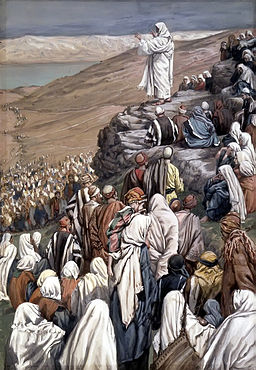70. Jesus eases John's doubts: Matthew 11:1-19, Luke 7:18-35
Who was Jesus?
News of Jesus' fame had reached Herod's palace at Machaerus in Perea where John had been imprisoned for nearly a year. The expected kingdom had not yet come. Was Jesus the promised Messiah ("coming one") from Old Testament prophecy who would set up that kingdom? John sent some of his disciples to find out. Jesus revealed that He was the fulfillment of Isaiah 35:5 and 61:1
Then the eyes of the blind will be opened
And the ears of the deaf will be unstopped.
The Spirit of the Lord GOD is upon me,
Because the LORD has anointed me
To bring good news to the afflicted;
He has sent me to bind up the brokenhearted,
To proclaim liberty to the captives
And freedom to prisoners . . .
Behold, I am going to send My messenger,
and he will clear the way before Me.
And the Lord, whom you seek,
will suddenly come to His temple;
and the messenger of the covenant,
in whom you delight,
behold, He is coming,"
says the LORD of hosts.
Despite this, the Pharisees and lawyers still rejected God's purpose for themselves! John was an ascetic, and Jesus was a glutton. So, they rejected both and Jesus condemned them.
71. Jesus promises rest for the soul: Matthew 11:20-30
Judgment was not Jesus' primary objective in coming to earth (John 3:17), but He announced some "woe" on Chorazin, Bethsaida, and Capernaum. He had been in Galilee performing miracles for around a year right in front of their eyes (five of the ten miracles performed in Matthew 8-9 were in Capernaum), but they still did not repent and believe. Jesus contrasted these three Jewish cities with the wicked Gentile cities of Tyre and Sidon and the godless city of Sodom. (Genesis 18; 19; Ezekiel 27; 28). Each was destroyed by God for their wickedness.
"Woe" can mean judgment, but it can also include pity and sorrow. I think Jesus felt this for these cities too because He follows up this judgment with an invitation. The religious leaders were challenging Jesus because of their pride and would not come to Him like humble, innocent children, but Jesus invites ALL who are weary ("tired from hard toil) and heavy-laden with legalistic religious obligation and the sin of their lives to . . .
1) Come to a Him - Jesus was inviting those "spiritual zeros" he talked about in the Beatitudes (Event #49)
2) Take on His yoke - A yoke is a heavy wooden harness that fits over the shoulders of an ox or oxen and is attached to the equipment they would pull. His yoke was easy ("well-fitted") and restful. With Him, there is peace with God (Romans 5:1) and the peace of God (Philippians 4:6-8).
3) Learn from Him - The Greek word for the word "learn" is mathete and disciple is mathētēs. A disciple is a learner of His words, ways, and wisdom.APPLICATION
At the beginning of my time with God, I often give Him everything on my "plate": all the things that are burdening my heart and causing anxiety and sin. Sometimes I even draw a plate and put all those things in my life I am carrying on it.
Do this as you let Matthew 11:28-30 wash over your soul. Meditate in and linger long over it. Give Jesus the burdens you have been carrying and take on His yoke.
Sometimes, I like to meditate more deeply on a passage using different paraphrases:
Are you tired? Worn out? Burned out on religion?
Come to me. Get away with me and you’ll recover your life.
I’ll show you how to take a real rest.
Walk with me and work with me—watch how I do it.
Learn the unforced rhythms of grace.
I won’t lay anything heavy or ill-fitting on you.
Keep company with me and you’ll learn to live freely and lightly.
(Matthew 11:28–30, The Message)
Another exercise I love to do regularly includes these verses in Matthew 11 and Psalm 46:10. It is a way for you to process your circumstances ("your plate"), and your emotional responses to them, and to hear God's voice about it.
Also, at the beginning of my teaching about the Cycle of Grace, I guide you through a Lectio Divina of Matthew 11:28-30 in The Message:
Lord, thank You that You have promised REST for our weary souls. We come to You right now with all our burdens. We give our load to You. Thank You that You daily bear our burdens (Psalm 68:19). Amen.

